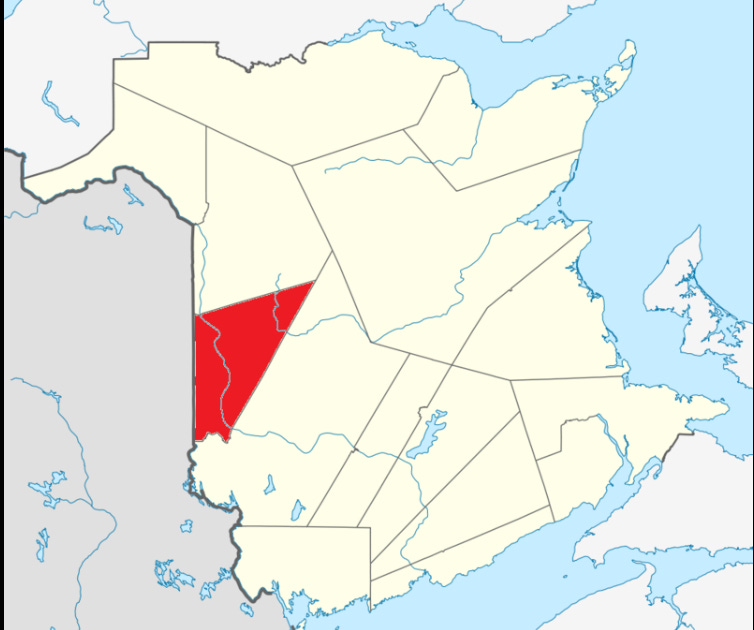Atlantic Canada Mondays - what is a dooryard?
Going local to talk about commonly used words in small places

Every region has its own lingo, a language within a language. In my part of Atlantic Canada there’s a quaint (to outsiders) term called a dooryard. But before I tell you what a dooryard is, let me zoom in on my part of Atlantic Canada a little more closely.
Like many other jurisdictions in Anglo-America, the province of New Brunswick is divided into counties. These smaller units used to be meaningful when government was less centralized in Canada; today they play some role in determining provincial government ridings but that’s about it.
I live in Carleton County (see the red area above), which is home to about 26,000 residents. The county is comprised of a few small towns, several villages, and lots of rural communities of low population density, surrounded by trees and farmlands. There are undoubtedly more trees than people.
In addition to accents which are like a weird cross of Texan and Irish, we have our own lingo, collectively known as Carleton Country Colloquialisms, headquartered on a website named, appropriately enough, dooryard.ca.
So, what’s a dooryard? Here’s the official definition from dooryard.ca:
dooryard \'dor-yard\ n - The exterior area of a home surrounding the most commonly used entryway, typically the driveway area; "Buddy does a good job of plowin' out th' dooryard." A logical extension of "barnyard," "back yard" and "front yard," it is likely that this compound word grew out of a necessity to distinguish working areas from living areas. In a practice common to the region, homes were attached to barns and other out-buildings; dooryard identifies the exterior area of a home not given over to farming. A household word in the County, dooryard is seldom heard elsewhere.
I did not grow up on a farm (though a number of friends and classmates did) but dooryard was still the commonly used term, although kind of synonymous with driveway. It helps to think of a dooryard as being closely associated with rural living, where your nearest neighbour could be hundreds of metres away instead of, say, 2 metres away.
Driveways are less likely to be paved “in the country”, leading to a reduced demarcation between the surface that cars would normally travel across or be parked upon and the adjacent land, which may or may not be grassy. A dooryard could a place for play, keeping in mind the implicit boundary you don’t want kids to cross if you have a lot of vehicles going in and out of your home.
Generally you do not mow a dooryard.
My own informal polling suggests that dooryard is fairly commonly used in adjacent counties to the north, south and east of Carleton County and may have some limited usage in Nova Scotia and PEI. I’m not aware of the term being used in New England but I suspect it may have some use in northern and eastern Maine (where it would likely be pronounced doar-yahd).
Anyway, there’s Wonderwall, I mean, there’s the definition of dooryard. Now you know more about Atlantic Canada and have something to share at the water cooler (or daily Zoom call). Ask me about fiddleheads sometime!
Over to you: what’s a bit of your own local dialect or lingo that is unique to your home area? Share it in the comments!





Grew up on the north shore. Never heard dooryard until I started spending time in Charlotte County. I also heard, "couple few" in that county. "How bad was the lineup at Tim Hortons?" "Not bad, there was a couple few ahead of me."
I've never heard of a dooryard - fascinating post, Mark!
Talking to US contacts I've never quite got to grips with the difference between 'garden' and 'yard'. Over here in UK, a 'yard' is what you'd call a small, concreted, area with a wall around it outside the back of a small terraced house, where you'd store the dustbins and hang out your washing to dry. It might have a coal bunker, and perhaps a small lean-to shed. The house I lived in as a student had exactly this.
Talking to an American lady once about where she lived, I asked her if she had a garden. 'A GARDEN? Gee, I'd LOVE a GARDEN. We have a yard!'
When she explained what her yard looked like, what she was describing was exactly what I'd call a garden! I'm still wondering what is meant by 'garden' in US English. Wish I'd asked her at the time.